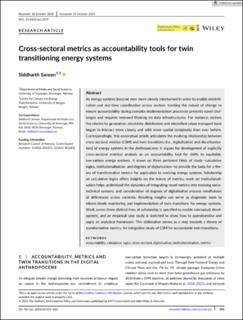| dc.contributor.author | Sareen, Siddharth | |
| dc.date.accessioned | 2024-03-25T13:59:35Z | |
| dc.date.available | 2024-03-25T13:59:35Z | |
| dc.date.created | 2024-01-28T00:14:43Z | |
| dc.date.issued | 2023 | |
| dc.identifier.issn | 1756-932X | |
| dc.identifier.uri | https://hdl.handle.net/11250/3124120 | |
| dc.description.abstract | As energy systems become ever more closely intertwined in order to enable electrification and real-time coordination across sectors, tracking the nature of change to ensure accountability during complex implementation processes presents novel challenges and requires renewed thinking on data infrastructures. For instance, sectors like electricity generation, electricity distribution and electrified urban transport have begun to interact more closely and with more spatial complexity than ever before. Correspondingly, this conceptual article articulates the evolving relationship between cross-sectoral metrics (CSM) and twin transitions (i.e., digitalisation and decarbonisation) of energy systems in the Anthropocene. It argues for development of explicitly cross-sectoral metrical analysis as an accountability tool for shifts to equitable, low-carbon energy systems. It draws on three pertinent fields of study—calculative logics, institutionalisation, and degrees of digitalisation—to provide the basis for a theory of transformative metrics for application to evolving energy systems. Scholarship on calculative logics offers insights on the nature of metrics, work on institutionalisation helps understand the dynamics of integrating novel metrics into evolving sociotechnical systems, and consideration of degrees of digitalisation ensures mindfulness of differences across contexts. Resulting insights can serve as diagnostic tools to inform timely monitoring and implementation of twin transitions for energy systems. Work across three distinct lines of scholarship is specified to enable conceptual development, and an empirical case study is sketched to show how to operationalise and apply an analytical framework. This delineation serves as a step towards a theory of transformative metrics, for integrative study of CSM for accountable twin transitions. | en_US |
| dc.language.iso | eng | en_US |
| dc.publisher | Wiley | en_US |
| dc.rights | Navngivelse 4.0 Internasjonal | * |
| dc.rights.uri | http://creativecommons.org/licenses/by/4.0/deed.no | * |
| dc.title | Cross-sectoral metrics as accountability tools for twin transitioning energy systems | en_US |
| dc.type | Journal article | en_US |
| dc.type | Peer reviewed | en_US |
| dc.description.version | publishedVersion | en_US |
| dc.rights.holder | Copyright 2023 The Author(s) | en_US |
| cristin.ispublished | true | |
| cristin.fulltext | original | |
| cristin.qualitycode | 1 | |
| dc.identifier.doi | 10.1002/eet.2079 | |
| dc.identifier.cristin | 2201525 | |
| dc.source.journal | Environmental Policy and Governance | en_US |
| dc.source.pagenumber | 593–603 | en_US |
| dc.identifier.citation | Environmental Policy and Governance. 2023, 33, 593–603. | en_US |
| dc.source.volume | 33 | en_US |

